As Hinduism has so many variations it is not possible to clearly identify this pagan belief’s teachings or to categorize all its perverse aspects. The most fundamental fact about the superstitious Hindu religion is that it is a pagan belief that sanctions and encourages the worship of idols.
It is not an easy task to determine what kind of divinity Hindus believe in as they vary from community to community, town to town, and from one family to another. The only thing that can be said for sure about this superstitious religion is that it is heretical and pagan. Hindus interpret their ancient traditions in many different ways. Despite the fact that they worship millions of different idols, believe in their super natural powers of reward and punishment, they nevertheless do not consider themselves idolatrous. As they believe in a “universal spirit” called “Brahma” of which all the other idols are reflections of, they claim that Hinduism is a monotheistic religion.
In reality this is a perverse interpretation incompatible with Islam and as such, it is idolatrous. There is no need for a comprehensive investigation or long term observation to expose Hinduism as an idolatrous religion; the billions of idols spread across India reveal this fact by observation.

Yes, indeed! Everyone in the heavens and everyone on the earth belongs to Allah. Those who call on something other than Allah are not really following their partner-gods. They are only following conjecture. They are only guessing. (Surah Yunus: 66)
Idolatry is clearly defined in the verses of the Qur’an. The Arab idol worshippers of our Prophet Muhammad’s (may Allah bless him and grant him peace) era believed in Allah as the Creator and Governor of the universe, but also believed in the powers of the idols they worshipped besides Him (Allah is beyond that) and often only because they thought of them as a “way” to Allah. There are obvious similarities between the ignorant Arab societies’ idolatrous beliefs and the Hindus’ belief in Brahma. Allah reveals the error of such people in the following verse:
Indeed is the sincere religion not Allah’s alone? If people take protectors besides Him – “We only worship them so that they may bring us nearer to Allah” – Allah will judge between them regarding the things about which they differed. Allah does not guide anyone who is an ungrateful liar. (Surat az-Zumar: 3)
The ignorance of idolatry resembles Hinduism as Hindus, too, by their own foolish rationale, worship their so-called idols, make offerings to them, and revere and fear them. Hinduisms teachings clearly demonstrate that it is an idolatrous system of belief.
For a Muslim it is quite easy to define Hinduism as Muslims have a guide that distinguishes between right and wrong. The Qur’an is a guide sent by Allah for the enlightenment of all people.
Islam acknowledges Allah to be the One and Only Allah and the system of faith is based on this principle and Muslims are people who believe in La Ilahe IllAllah (no god but Allah). Allah reveals the creation purpose of man: “I only created jinn and man to worship Me.” (Surat adh-Dhariyat: 56) Every human being is responsible for surrendering and praying only to Allah, to ask only Allah for His help and not to associate anything or anyone else with our Lord and His attributes Allah reveals in the following verse:
Say: “I am commanded to worship Allah, making my religion sincerely His.” (Surat az-Zumar: 11)
And the following verse reminds us of this reality:
So set your face firmly towards the Religion, as a pure natural believer, Allah’s natural pattern on which He made mankind... (Surat ar-Rum: 30)
Allah is the Sole Proprietor, Creator and Keeper of the universe and its inherent order. He is the One Who created the universe from nothing, gave it its form and order, created every living being found in the skies, the earth and in between and gave them life and sustenance. Allah reveals in Surah Fatir as:
He makes night merge into day and day merge into night, and He has made the sun and moon subservient, each one running until a specified time. That is Allah, your Lord. The Kingdom is His. Those you call on besides Him have no power over even the smallest speck. (Surah Fatir: 13)
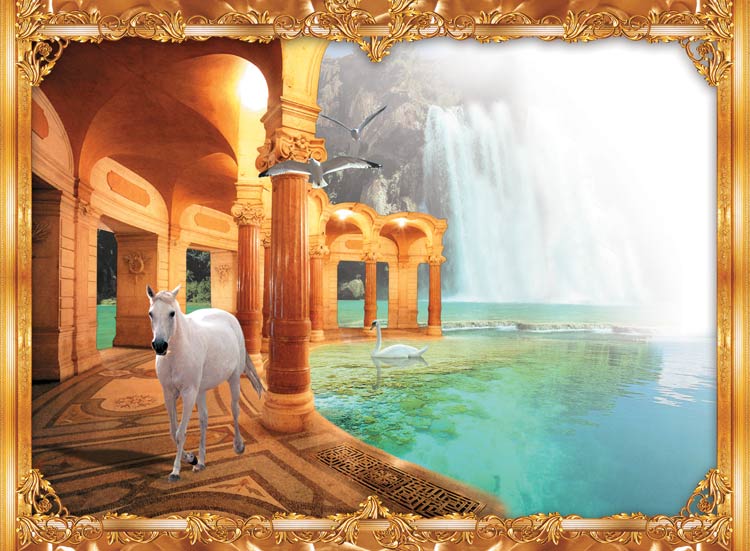
Everything in the heavens and everything in the earth belongs to Him. Allah is the Rich Beyond Need, the Praiseworthy. (Surat al-Hajj: 64)
Our Lord Who created the whole universe in perfection is All-Knowing. Those who associate other beings with Him are committing a grave sin by prostrating before lifeless idols, which they also unwisely revere, because Allah owns everything that exists and only He deserves reverence, obedience and gratefulness. This fact is revealed in the verses:
Say, “O Allah! Master of the Kingdom! You give sovereignty to whoever You will, You take sovereignty from whoever You will. You exalt whoever You will You abase whoever You will. All good is in Your hands. You have power over all things.” (Surah Al ‘Imran: 26)
Our Lord rules everything alive or lifeless and He is witness to everything we say, think or do. He is the One Who knows what people think and secretly scheme and He knows the best kept secrets.
You do not engage in any matter or recite any of the Qur’an or do any action without Our witnessing you while you are occupied with it. Not even the smallest speck eludes your Lord, either on earth or in heaven. Nor is there anything smaller than that, or larger, which is not in a Clear Book. (Surah Yunus: 61)

Mankind! You are the poor in need of Allah whereas Allah is the Rich Beyond Need, the Praiseworthy. (Surah Fatir: 15)
Every being on the face of the earth is dependent on Allah, Who is above human weaknesses and does not depend on anything Himself. Allah is the Only being to seek refuge with and depend on and it is only Him that faith and hope belong to. Allah has always been, and always will be, and He always was, is and will be alive:
Allah, there is no god but Him, the Living, the Self-Sustaining. He is not subject to drowsiness or sleep. Everything in the heavens and the earth belongs to Him. Who can intercede with Him except by His permission? He knows what is before them and what is behind them but they cannot grasp any of His knowledge save what He wills. His Footstool encompasses the heavens and the earth and their preservation does not tire Him. He is the Most High, the Magnificent. (Surat al-Baqara: 255)
Allah is All-powerful and everything happens within His knowledge and will. Everything that happens between the heavens and earth, does so by His will. Death and birth, natural phenomena and everything conceivable; they all happen by His will. Every decision, from the smallest to the biggest and every subsequent action, they all happen by His will. Every single one of the trillions of cells in our bodies with all their parts and functions down to the last detail, including the systems that sustain them, is controlled by Allah. Everything on the Earth, itself spinning around in the emptiness of the universe, even the sustenance and reproduction of the little ants, are by the will of Allah. He reveals this reality with the following verse:
… There is no creature He does not hold by the forelock… (Surah Hud: 56)
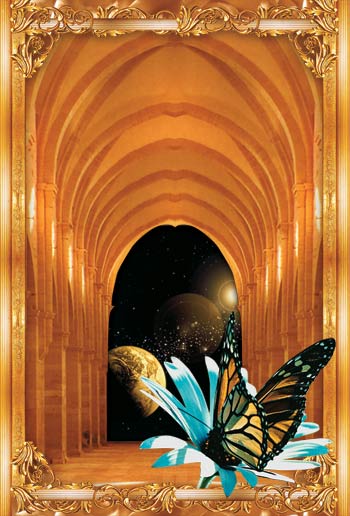
He created the heavens and the earth with truth. He is exalted above anything they associate with Him. (Surat an-Nahl: 3)
No human being or any other creature has any power independent of Allah and all beings surrender to Him. Everything in the heavens and on the earth has submitted to Allah and is under His control. No one can move outside of Allah’s will and control, not even say a word. Allah owns all the worlds and all power rests with Him. Forgetting this reality and hoping for the help from beings carved out of stone, that can neither help themselves nor others in the slightest way unless Allah wills it, will bring people nothing but disaster on earth as well as the hereafter. Allah states in the Surat al-A‘raf:
Do they make things into partner-gods which cannot create anything and are themselves created; which are not capable of helping them and cannot even help themselves? If you call them to guidance they will not follow you. It makes no difference if you call them or stay silent. Those you call on besides Allah are servants just like yourselves. Call on them and let them respond to you if you are telling the truth. Do they have legs they can walk with? Do they have hands they can grasp with? Do they have eyes they can see with? Do they have ears they can hear with? Say: “Call on your partner-gods and try all your wiles against me and grant me no reprieve. My Protector is Allah Who sent down the Book. He takes care of the righteous.” Those you call on besides Him are not capable of helping you. They cannot even help themselves. If you call them to guidance, they do not hear. You see them looking at you, yet they do not see. (Surat al-A‘raf: 191-198)

A bronze statue of the Hindu deity Brahma
Instead of Allah you worship only idols. You are inventing a lie. Those you worship besides Allah have no power to provide for you…(Surat al-‘Ankabut: 17)
Examining Hinduism reveals a practice full of perverted, pagan, primitive, irrational and illogical rituals. Hindus spend their entire lives worshipping their imaginary gods in ignorance. It is possible to see these idols everywhere in India: in temples, homes, small roadside shanties, in carved stone images, in advertising, calendars, movie posters, shops, jewelry, statuettes and house decorations, in short, they are imbedded in every area of life in Hindu dominated lands.
Allah reveals the situation of such people in the Surah Fatir:
If you call on them they will not hear your call, and were they to hear, they would not respond to you. On the Day of Resurrection they will reject your making associates of them. No one can inform you like One Who is All-aware. (Surah Fatir: 14)
One of the reasons why Hindus claim not to be idolatrous is that they know that the rest of the world is aware of the nonsensical nature of their superstitious religion. When they claim that the idols they worship are in reality not idols but means by which they reach “Brahma” or the “universal spirit”, they are not aware of the fact that throughout history, all idolatrous people have made the same claim. As we have already stated, the deniers by association at the time of our Prophet Muhammad (may Allah bless him and grant him peace) claimed too that they worshipped idols only in order to reach Allah. The reason for this heretical belief is that the deniers of the ignorant era who ascribed partners to Allah, like the Hindus, blindly and without questioning, followed the teachings inherited from their forefathers. Allah reveals in the Qur’an the inherent bigotry of the Prophet Abraham’s (pbuh) nation in a conversation between him and them:
When he said to his father and his people, “What do you worship?” They said, “We worship idols and will continue to cling to them.” He said, “Do they hear you when you call or do they help you or do you harm?” They said, “No, but this is what we found our fathers doing.” (Surat ash-Shu‘ara’: 70-74)
The leading propagators of the propaganda to enhance the so-called appeal of Hinduism are not necessarily Hindus themselves. Materialistic and Darwinist circles play an important role in this propaganda machine as we will see in the coming chapters in greater detail. However, there is a natural dislike originating in the Christian traditions of the west against idolatry. Even though Christianity itself has been altered over time and suffered degeneration, it nevertheless preserved some of its original core values. As such, Christianity considers idolatry as a form of perversion and regards Hinduism as an idolatrous religion. Circles wishing to introduce Hinduism into western society use the term “universal spirit” in order to conceal its inherent perversions and to disassociate it from idolatry. Exposing this fraud for what it is can be done by inviting the adherents of the Hindu faith to listen to the voice of their conscience, to reflect and to use their reason. Allah reveals that we must appeal to the conscience of people who err by acquiring other gods besides Him:
… Say: “So why have you taken protectors apart from Him who possess no power to help or harm themselves?” Say: “Are the blind and seeing equal? Or are darkness and light the same? Or have they assigned partners to Allah Who create as He creates, so that all creating seems the same to them?” Say: “Allah is the Creator of everything. He is the One, the All-Conquering.” (Surat ar-Ra‘d: 16)
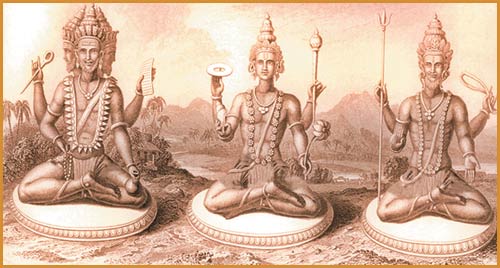
Brahma, Vishnu and Shiva are the three most revered Hindu deities. According to the pagan beliefs of Hinduism, these three imaginary deities have many powers. It is impossible for a person of common sense to believe that idols carved of stone or wood could help them in the belief that they have powers and might.
In our book titled Islam and Buddhism we examined in detail the heretic beliefs of Buddhism that instruct the twisted worship of Buddha statues, making offerings of food to them and to devote oneself to Buddha in hunger and destitution. (See: Islam and Buddhism, Harun Yahya, May, 2003). The number of idols worshipped in Hinduism reaches 300-350 million as every Hindu can make his own according to the perverted teachings of Hinduism, or worship any being of his choice, alive or dead. There is one idol for every three Hindus. And this demonstrates sufficiently that the whole religion is just one great myth.
Hindus can ascribe divinity to virtually everything and anything; to people, animals, plants, even to places or natural phenomena, such as rivers, mountains, etc. Each town has its own invented divinity and there are idols of monkeys, snakes and many others at the gateway to each town. Every Hindu has a shrine with his own idols in his home and even within the same household there can be different idols for different members of the family to whom they bow down. In the mornings they wake their idols with lights and songs, clean them and make offerings to them in the form of flowers, food and milk. Allah reveals that these idols of idolatrous nations by which people are misled, have no power whatsoever:
“Do they have legs they can walk with? Do they have hands they can grasp with? Do they have eyes they can see with? Do they have ears they can hear with? (Surat al-A‘raf: 195)

Hindus use every opportunity to revere their idol Ganesha. These strange rituals are incompatible with reason and will cause them nothing but a loss here as well as in the hereafter.
Hindus do not ponder the great error, irrationality or warped logic inherent in their worship; indeed, they regard every action of theirs as a so-called act of worship. This kind of worship offered to idols or so called divinities of stone or wood is a strictly forbidden sin in all religions based on Divine revelation. Those who worship anything besides Allah, alive or dead, are termed to be idolaters in the Qur’an, meaning to ascribe partners to Allah. Ascribing partners to Allah means to value other beings on equal terms with Him or to value them higher (Allah is beyond that). Someone who ascribes partners to Allah in grave ignorance directs his love and attention to these other beings rather than Him and thus he will have acquired these other beings as his gods. Whilst some deniers by association deny Allah’s existence outright, others worship their other “divinities” alongside Him. There are many verses in the Qur’an revealing that Allah will not forgive those who ascribe partners to Him and the following are some of them:
Allah does not forgive anything being associated with Him but He forgives whomever He wills for anything other than that. Anyone who associates something with Allah has committed a terrible crime. (Surat an-Nisa’: 48)
“…Tribe of Israel! Worship Allah, my Lord and your Lord. If anyone associates anything with Allah, Allah has forbidden him the Garden and his refuge will be the Fire.” The wrongdoers will have no helpers. (Surat al-Ma’ida: 72)
Allah does not forgive anything being associated with Him but He forgives whomever He wills for anything other than that. Anyone who associates something with Allah has gone very far astray. (Surat an-Nisa’: 116)
Luqman’s (pbuh) advise to his son is related in another verse:
… ”My son, do not associate anything with Allah. Associating others with Him is a terrible wrong.” (Surah Luqman: 13)
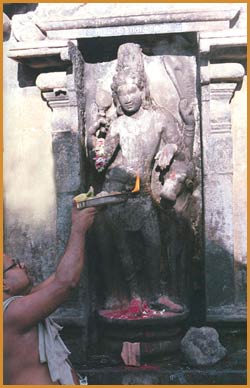
Making food offerings to their idols is an important Hindu ritual. Hindus do not ponder the irrationality of offering food to stone; they just continue the practices inherited from their ancestors.
The mindless rituals of Hindu beliefs are so numerous and detailed that they cannot be recounted one by one. There are different sects, myths, rituals and perverse sacrificial ceremonies dedicated to each idol in the Hindu scriptures. These myths tell of the family lives, enemies, weaknesses, ambitions, supernatural powers and methods of punishment of these idols. Hindus also ignorantly revere every being, living or dead that is touched by, used for transport or spend time with these idols. Their daily lives are divided into periods for the reverence of different idols at different times and Hindus genuinely believe in their existence and power. The most revered divinities of Hindus are the following three: Brahma, Vishnu and Shiva. Brahma is the imaginary creator, Vishnu the protector and Shiva is the destroyer. Hinduism is based on millions of such superstitious beliefs. Fantastic stories belonging to the world of fairytales are presented here as a superstitious religion. Islam on the other hand is based on the Qur’an, described as follows by our Lord:
Falsehood cannot reach it from before it or behind it –it is a revelation from One Who is All-Wise, Praiseworthy. (Surah Fussilat: 42)
… The Qur’an was sent down as guidance for mankind, with Clear Signs containing guidance and discrimination. (Surat al-Baqara: 185)
Someone who believes in Allah will spend his entire life according to Allah’s good pleasure and will abide by Allah’s commandments revealed in the Qur’an. A Believer is recognized by his deep love for, and fear of Allah, genuine faith and strong conscience. As he follows the voice of his conscience at all times in his life, he can distinguish between right and wrong, has insight as well as foresight and is rational. He is well aware of the great loss that is harvested by people who distance themselves from the morality of the Qur’an and instead simply follow the traditions inherited from their ancestors. The situation of the deniers who lack these qualities is revealed in the verses:
Instead of Allah you worship only idols. You are inventing a lie. Those you worship besides Allah have no power to provide for you. So seek your provision from Allah and worship Him and give thanks to Him. It is to Him you will be returned. (Surat al-‘Ankabut: 17)
Say: “Call on those you make claims for besides Allah. They have no power over even the smallest particle, either in the heavens or in the earth. They have no share in them. He has no need of their support.” (Surah Saba’: 22)
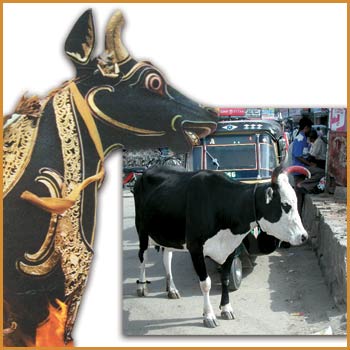
Allah reveals in the Qur’an that the Israelites idolized the calf. It is interesting to note that Hindus revere the cow as a deity.
Like all people who ascribe partners to Allah, Hindus too fall into the same mistake by believing that the idols they worship have powers independent of Allah. They believe that the idols of stone or wood before which they prostrate themselves can hear them and are aware of the sins they commit and that they can harm or curse them. In reality they commit a grave sin by believing in this falsehood and they enter an irrational and illogical dead-end in this way. Allah offers them salvation in the following way:
Allah is He Who created you, then provides for you, then will cause you to die and then bring you back to life. Can any of your partner-gods do any of that? Glory be to Him and may He be exalted above anything they associate with Him! (Surat ar-Rum: 40)
The superstitious rituals of Hinduism are so numerous that it is impossible to recount them all. For instance, Hindus genuinely revere the icons in their shrines. Like divine guests, they are offered love, services and very much devotion. They are given water to drink and wash, clothing, flowers, incense and much more. These idols are awakened each morning like a human being, dressed, visited by other Hindus, supposedly worshipped and then left to rest. During religious Hindu festivals communal offerings are made to them, they are given presents, fasted for and everybody tries to prove his devotion and reverence to these powerless things in great ignorance.5 Hindus are not aware of the futility and debasement of their actions. They cannot comprehend the irrationality and nonsense of awakening and dressing them, or talking to them, and they are ignorant of the fact that only schizophrenics live under such illusions. Allah reveals the superstitious beliefs of idolaters:
He said, “Do they hear you when you call or do they help you or do you harm?” They said, “No, but this is what we found our fathers doing.” (Surat ash-Shu‘ara’: 72-74)
According to the superstitious beliefs of Hinduism, cows, monkeys, some bird, bear and crocodile species, deer, elephants, cats, mice, vultures, ravens and dogs are sacred6 and Hindus therefore revere these creatures with the same reverence as they would with their other divinities. For instance, in the Karni Mata Temple in Deshnoke, India no one harms or hinders the rats who live there as this is acknowledged to be a big sin.7 The most sacred and revered animals of all is the cow. A Hindu, if he encounters a cow or the picture of a cow on his way, perversely begins to offer his respects as he ignorantly believes that the cow is a most sacred and divine creature with supernatural powers, the “mother of mankind”.
The cow is considered to be the mother of the heavens, the air and the earth in the Hindu faith. (Allah is beyond that) This is why cows can freely roam on roads, shopping centers or wherever they wish. The eating of its flesh is forbidden, and killing a cow is prohibited by law. The excrement and urine of cows is considered sacred and valuable in equal measures. As Hindus believe that they have healing as well as soul purifying properties, the excrement and urine of the cow is revered, and can be eaten or drunk.8 It goes without saying that the worship of cows to this extent with such repulsive practices requires mental, spiritual and rational degeneration. The fact that not even university educated Hindus of a certain intellectual capacity will compromise on these perverse practices, shows clearly the dark and dangerous hold of the Hindu faith on people. These people’s minds are so clouded by the superstitious Hindu traditions that they are no longer aware of what they are doing and why they are doing it; they have lost the ability to distinguish between right and wrong. There is another factor they are unaware of: even if all their idols were to join their forces, “nothing and no one and no way” could they prevent a disaster sent to them by Allah. Allah says in the Surat al-A‘raf:
Do they make things into partner-gods which cannot create anything and are themselves created; which are not capable of helping them and cannot even help themselves? (Surat al-A‘raf: 191-192)
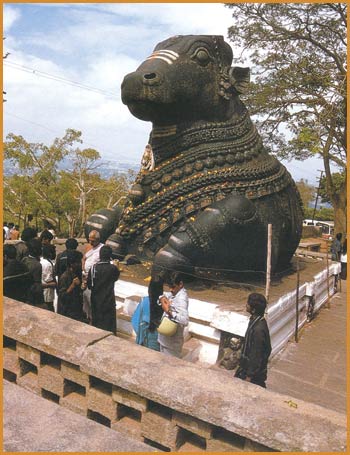
It is obvious that worshipping cows is a perversion of reason, ethics and the soul. It is truly surprising to see that a whole nation can have such an irrational belief in the 21st century.
It is interesting to observe that cows are sacred animals in the Hindu faith, because Allah reveals many verses of the Qur’an regarding those who perversely worshipped the calf: As for those who took the calf (for worship), anger from their Lord will overtake them together with abasement in the life of this world. That is how we repay the purveyors of falsehood. (Surat al-A‘raf: 152) It is revealed in the verses that when the Prophet Moses (pbuh) left his nation, some of the Israelites began to idolize the calf and worshipped it in his absence. Allah reveals in Surat al-Baqara as:
And when We allotted to Moses forty nights. Then you took the calf (for worship) when he had gone and you were wrongdoers. (Surat al-Baqara: 51)
Then he produced a calf for them, a physical form which made a lowing sound. So they said, “This is your god – and Moses’s god as well, but he forgot.” Could they not see that it did not reply to them and that it possessed no power to either harm or benefit them? (Surah Ta Ha: 88-89)
Moses brought you the clear signs; then, after he left, you took the calf (for worship) and were wrongdoers. Remember when We made a covenant with you and lifted up the Mount above your heads: “Take hold vigorously of what We have given you and listen.” They said, “We hear and disobey.” They were made to drink the calf into their hearts because of their disbelief. Say, “If you are believers, what an evil thing your faith has made you do.” (Surat al-Baqara: 92-93)
After he left, Moses’s people took the calf (for worship) made from their ornaments, a form which made a lowing sound. Did they not see that it could not speak to them or guide them to any way? They adopted it and so they were wrongdoers. (Surat al-A‘raf: 148)
As for those who took the calf (for worship), anger from their Lord will overtake them together with abasement in the life of this world. That is how we repay the purveyors of falsehood. (Surat al-A‘raf: 152)
They said, “We will not stop devoting ourselves to it until Moses returns to us.” (Surah Ta Ha: 91)

The woman in the picture worships Krishna in the Venugopalas Wamy temple carved into a tree. In the pagan Hindu beliefs, such trees are divine too. Islam rejects such irrational beliefs of idolatrous societies and commands the worship of our most compassionate and merciful Lord, the one and only ruler of the universe.
As revealed in the verses some of the Israelites devoted themselves to the calf and Aaron (pbuh) was forced to warn them repeatedly to stop this perversion. The Surah Ta Ha reveals Aaron’s (pbuh) warning:
Aaron had earlier said to them, “My people! It is just a trial for you. Your Lord is the All-Merciful, so follow me and obey my command!” (Surah Ta Ha: 90)
When the Prophet Moses (pbuh) returns to his nation, he finds them worshipping the calf:
And when Moses said to his people, “My people, You wronged yourselves by taking the calf (for worship) so turn towards your Maker and kill yourselves. That is the best thing for you in your Maker’s Sight.” And He turned towards you. He is the Ever-Returning, the Most Merciful. (Surat al-Baqara: 54)
The similarity between modern Hindus, who worship the cow, and some of the Israelites of the Prophet Moses (pbuh) era who took the calf as their chosen divinity, is striking. The Hindus too, out of grave ignorance, chose the cow to which Allah refers to in many of His verses and not an other animal or object as their god and committed a grave sin by doing so. However, some of the Israelites at the time of the Prophet Moses (pbuh) subsequently realized their big error and Allah accepted their repentance and forgave them their sin. The Hindus too should realize the perversion of such a belief, repent with a true heart and surrender truthfully to Allah. It can be hoped that Allah will forgive them too and guide them onto the righteous path. Allah reveals in Surat al-Baqara as:
Except for those who repent and put things right and make things clear. I turn towards them. I am the Ever-Returning, the Most Merciful. But as for those who disbelieve and die while they are disbelievers, the curse of Allah is upon them and that of the angels and all mankind. They will be under it for ever. The punishment will not be lightened for them. They will be granted no reprieve. (Surat al-Baqara: 160-162)
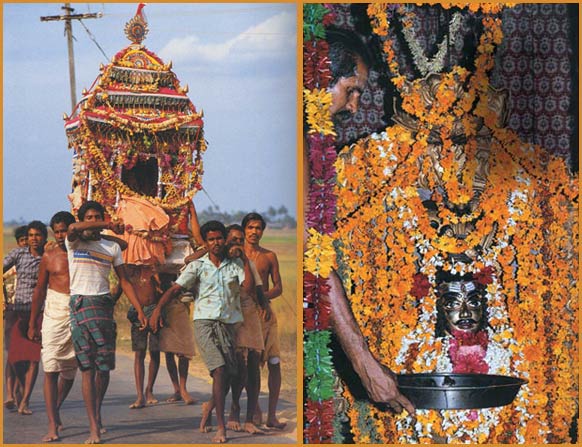
The idolatrous Hindus first wash their idols, then paint their faces and finally decorate them with flowers. This pagan ritual is performed across all of India. Whereas they consider to be doing something worthwhile with such acts of worship, they are in reality making a grave mistake.
During the Dola Pumima festival, young people consider it to be an honor to be selected to carry the statue of Krishna. It is clearly a perversion to believe that an idol could see those who worship him, could protect them, answer their prayers or respect their offerings of submission.
In Hinduism it is not only people and animals that are idolized. Almost anything one can encounter in everyday life has been made (in great ignorance) into something sacred and thus into a so-called object of worship. For instance, the streams that flow and join by the will of Allah, the trees that grow from the fallen seed by His will and the mountains Allah holds down are revered by Hindus as supposedly sacred. In reality all these things bow to Allah:
Do you not see that everyone in the heavens and everyone on the earth prostrates to Allah, and the sun and moon and stars and the mountains, trees and beasts and many of mankind?... ( Surat al-Hajj: 18)
Everything in the heavens and every creature on the earth prostrates to Allah, as do the angels. They are not puffed up with pride. (Surat an-Nahl: 49)

Hindus worship millions of idols in sheer ignorance and consider the Ganges and the Himalayas divine. People who forsake Allah for the worship of stone, earth and water are being led to great suffering unless they abandon such heretical beliefs.

Hindu beliefs command people to believe in the irrational myth that washing in the Ganges cleanses all sins.
This superstitious belief leads the Hindus to concoct irrational myths on mountains and rivers according to which they have life and soul. The Ganges is the best known river Hindus revere and the Himalayas are their most sacred mountains.9 In the perverse Hindu belief, Agni is the divinity of fire, Surya the sun divinity, Varuna of the oceans, Vayo of the winds, Vishkarma of buildings, and Yama is the divinity of death. Just these by themselves are sufficient to demonstrate the irrational and mythical nature of Hinduism, as no one of an adequate intellectual capacity could or would believe in the supernatural and invincible power of a river. These are things only people whose mental faculties are hindered by false convictions can believe and yet, there are around 1 billion people who blindly put their faith into this superstitious religion.
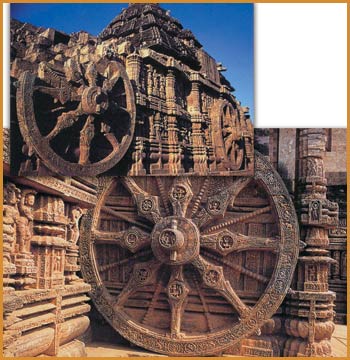
Ancient idolatrous nations like the Hindus have also worshiped the sun and built temples dedicated the worship of it. On the right: Picture of the Konarak temple in the Orissa district.
Today, the perversity of worshipping the Sun still persists in India. The most important temple dedicated to the worship of the Sun is the Konarak Temple in the Orissa district.10 Worshipping the Sun is another feature of the Hindus that bears resemblance to ancient pagan cultures and it is one of the oldest aberrations of mankind. Some people who realized that the Sun provides them with light and warmth were misled to believe that the Sun gave them life and thus they came to form the primitive belief in the Sun as a divinity. This false belief led many a civilization away from Allah’s religion in the history of mankind, a fact revealed in the Qur’an which tells the story of the People of Sheba who ignorantly worshipped the Sun at the time of the Prophet Solomon (pbuh):
I found both her and her people prostrating to the sun instead of Allah. Satan has made their actions seem good to them and debarred them from the Way so they are not guided and do not prostrate to Allah, Who brings out what is hidden in the heavens and the earth, and knows what you conceal and what you divulge. (Surat an-Naml: 24-25)
A careful examination of the situation reveals that it is ignorance and irrationality that leads people to worship the Sun. True enough, the Sun is our source of light and heat, but we owe gratefulness to its Creator Allah, not the Sun, which is a huge mass of hydrogen and helium created by Allah that will one day expire or be destroyed by Him before then. Allah has created all the stars in the universe, including the Sun, from nothing and it is therefore only Him Who must be exalted and praised. The following is one of the verses that reveal this fact:
Among His Signs are the night and day and the sun and moon. Do not prostrate to the sun nor to the moon. Prostrate to Allah Who created them, if you worship Him. (Surah Fussilat: 37)

Among His Signs are the night and day and the sun and moon. Do not prostrate to the sun nor to the moon. Prostrate to Allah Who created them, if you worship Him. (Surah Fussilat: 37)
There is no doubt that in the eternal life in the hereafter those people who forgot Allah and worshipped instead powerless stone idols and thus lived in aberration, will suffer the greatest loss of all. They waste their entire lives trying to please their idols whilst believing in the lie that they will be reincarnated time after time without ever dying in the true sense of the word, but on death, they will realize that the lies they believed in only served to led them astray. Allah reveals this fact in the Surat al-‘Ankabut:
He said, “You have adopted idols apart from Allah as tokens of mutual affection in this world. But then on the Day of Resurrection you will reject one another and curse one another. The Fire will be your shelter. You will have no helpers.” (Surat al-‘Ankabut: 25)

He to whom the kingdom of the heavens and the earth belongs. He does not have a son and He has no partner in the Kingdom. He created everything and determined it most exactly. (Surat al-Furqan: 2)
Our Prophet Muhammad (may Allah bless him and grant him peace) said the following about people who ascribe partners to Allah: “Whosoever dies as someone who ascribes partners to Allah, will enter hell.”11 But he also revealed the reward people who do not contaminate their faith by ascribing partners to Allah:
“Whosoever dies without ascribing partners to Allah, who genuinely believed in His unity and worshipped Him with a true heart and who performed prayer and did the prescribed charity, will have died having earned Allah’s good pleasure.”12
5. Korhan Kaya, Hinduizm, Dost Yayınevi, Şubat 2001, Ankara, s. 48
6. Korhan Kaya, Hinduizm, Dost Yayınevi, Şubat 2001, Ankara, s. 68
7. Khushwant Singh, India An Introduction, New Delhi, 1990, s. 44. Murtahin Billah Fazlie, Hinduism and Islam, A Comparative Study, Islamic Book Service, New Delhi, s. 76
8. "Lynching 5 Dalits in Police Presence Exposes India's Inhuman Caste System", http://www.islamonline.net/english/news/2002-10/17/article54.shtml
9. Korhan Kaya, Hinduizm, Dost Yayınevi, Şubat 2001, Ankara, s. 62
10. Korhan Kaya, Hinduizm, Dost Yayınevi, Şubat 2001, Ankara, s. 23
11. Sahih Müslim, cilt 1, s. 138, no: 141
12. İbni Mace, 1. cilt, s. 119, no: 70